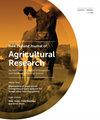奶牛品种和泌乳期对一日挤奶一次或一日两次乳固体脂肪含量的影响
IF 1.5
3区 农林科学
Q2 AGRICULTURE, MULTIDISCIPLINARY
New Zealand Journal of Agricultural Research
Pub Date : 2023-11-12
DOI:10.1080/00288233.2023.2278733
引用次数: 0
摘要
10℃时固体脂肪含量(SFC10)是影响牛油涂抹性的重要参数。本试验旨在研究奶牛品种和泌乳期对1天挤奶1次(OAD)和2天挤奶1次(TAD)乳脂SFC10的影响。在泌乳期的前、中、后期,从OAD奶牛群中采集39头荷斯坦-弗里西亚奶牛(F)、27头泽西奶牛(J)和34头荷斯坦-弗里西亚×泽西奶牛(F × J),从TAD奶牛群中采集104头F奶牛和83头F × J奶牛。采用牛奶脂肪酸组成回归模型预测SFC10。SFC10越低,黄油的涂抹性越高。F奶牛的SFC10低于J奶牛(P < 0.05)。F奶牛的SFC10低于F × J奶牛(P < 0.05)。两种挤奶频率下,泌乳早期的SFC10均低于泌乳中期和晚期。本研究表明,F牛乳和泌乳早期乳适合制作易于涂抹的牛油。如果消费者对更容易涂抹的黄油的偏好增加,这些结果可能适用于新西兰乳制品行业。本文章由计算机程序翻译,如有差异,请以英文原文为准。
Effect of breed and stage of lactation on the solid fat content of milk from cows milked once a day or twice a day
Solid fat content at 10°C (SFC10) is an important parameter of milk fat that influences the spreadability of butter. This study aimed to evaluate the effect of breed and stage of lactation on SFC10 of milk fat from cows milked once a day (OAD) or twice a day (TAD). Milk was collected from 39 Holstein-Friesian (F), 27 Jersey (J), and 34 Holstein-Friesian × Jersey (F × J) cows from a OAD herd and 104 F and 83 F × J cows from a TAD herd in early, mid and late lactation. The SFC10 was predicted using a regression model using milk fatty acid composition. The lower the SFC10, the higher the spreadability of butter. The SFC10 was lower (P < 0.05) for F cows compared with J cows milked OAD. The SFC10 was lower (P < 0.05) for F cows compared with F × J cows milked TAD. The SFC10 was lower in early lactation compared with mid- and late lactation in both milking frequencies. This study revealed that F cow milk and early lactation milk would be suitable for making more easily spreadable butter in OAD and TAD milking. These results could be applicable in the New Zealand dairy industry if consumer preference for more easily spreadable butter increases.
求助全文
通过发布文献求助,成功后即可免费获取论文全文。
去求助
来源期刊
CiteScore
4.90
自引率
16.70%
发文量
31
审稿时长
3 months
期刊介绍:
The New Zealand Journal of Agricultural Research publishes original research papers, review papers, short communications, book reviews, letters, and forum articles. We welcome submissions on all aspects of animal and pastoral science relevant to temperate and subtropical regions. The journal''s subject matter includes soil science, fertilisers, insect pests, plant pathology, weeds, forage crops, management systems, agricultural economics, agronomy, and animal science. The journal also accepts crossover papers on subjects such as land –water interactions.

 求助内容:
求助内容: 应助结果提醒方式:
应助结果提醒方式:


